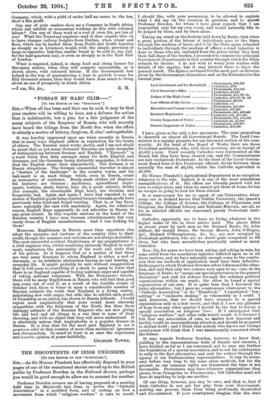SIR,—When all has been said that can be said, it
may be that your readers will be willing to hear, not a defence for action that is indefensible, but a plea for a fair judgment of the many subjects of the Emperor of Russia who will scarcely have heard the tidings from the North Sea when the affair is already a matter of history, forgiven, if, alas! unforgettable.
It was forcibly impressed upon me when recently in Russia that in many ways England suffers in reputation for the faults of others. The Russian mind works slowly, and I am not afraid to assert that as yet many thousand Russians are quite incapable of distinguishing between German and English. " Nyemets" is a word which does duty amongst many for both English and Germans, and the Germans being distinctly unpopular, it follows that the English share their unpopularity. The German is in Russia ubiquitous. The German commercial traveller is almost a "feature of the landscape" in the country towns, and his hall-mark is on most things which, even in Russia, count as necessaries of existence. Ready-made clothes (of disgrace- ful texture) are German ; machinery, agricultural imple- ments, buttons, studs, knives, hats (to a great extent), drinks (for example, the abominable Riga beer), are German, and frequently bad. Again and again I have had repeated to me stories of English goods being rejected because German goods have previously been tried and found wanting. That is, or has been, more especially the case with machinery. Again, for whatever reason, English firms apparently do not advertise in Russia to any great extent. In tiny wayside stations in the heart of the Russian country I have seen German advertisements, but very rarely those of English manufacturers. And I was looking for them !
Moreover, Englishmen in Russia more than anywhere else adopt the manners and customs of the country (this to their credit, though the manners and customs are not always desirable). The most successful resident Englishman of my acquaintance is a civil engineer who, whilst remaining intensely English in senti- ment, emphasises the nationality of his work and sinks that of his person. So it happens that as a matter of fact there are very many Russians to whom England is either a sort of Germany, or an indefinite abstraction having no real bearing on everyday life. It might probably be said without exaggeration that it will come as something of a shock to many to learn that there is an England capable of feeling national anger and capable of taking national vengeance. With the Westminster Gazette, there will be many Englishmen in Russia who will feel that good may come out of evil if, as a result of the terrible events of October 21st, there is borne in upon a considerable number of Russian subjects the truth that England is a living reality, palpitating now with anger, but able also to exhibit such proofs of friendship as no nation has shown to Russia hitherto. I would repeat most emphatically that none would more sincerely sympathise with the fishermen of the North Sea than those unhappy subjects of the Russian Emperor who are now giving life and love and all things in a war that is none of their choosing, and with an object that they will never understand. It is absolutely untrue that Anglophobia is a popular disease in Russia. It is true that for the most part England is vox at praeterea nihil in that country of more than mediaeval ignorance and obscurantism. So much at least is at once the experience and humble opinion of yours faithfully,
CHARLES TOWER.


















































 Previous page
Previous page